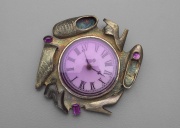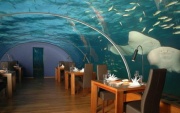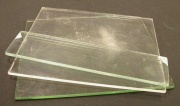Acrylic sheet
Description
A transparent, solid sheet made of acrylic resins. Originally introduced as 'organic glass' in 1931, the thermoplastic acrylic sheets are prepared by cast polymerization or extrusion. Some common brand names are Plexiglas®, Perspex, and Lucite®. Acrylic sheets are lightweight, tough, and colorless with excellent clarity and outdoor weather resistance. Compared to glass, acrylic is lighter and shatter-resistant, but more susceptible to scratching and transmission of UV. Acrylic has the unique ability to carry light around corners. Acrylic sheets are used for safety glass, aircraft canopies, windows, skylights, signs, instrument dials, tail light lenses, lighting fixtures, optical lenses, storage and display cases, bulletproof glass.
Synonyms and Related Terms
acrylic glass; lámina acrílica (Esp.); chapa acrílica (Port.)
Examples: Lucite® [Lucite]; Perspex® [Lucite); Plexiglas® [Arkema]; Altuglas® [Arkema]; Acrylite® [Piedmont Plastics]; Acrylplast
Other Properties
Soluble in mineral spirits, turpentine, aromatic hydrocarbons, chlorinated hydrocarbons, esters, and ketones. Insoluble in water, ethanol.
Several types of coatings can be added to increase scratch resistance and decrease UV light transmission.
| Density | 1.11-1.19 |
|---|---|
| Refractive Index | 1.49 |
Hazards and Safety
Combustible, but often self-extinguishing or slow burning.
Authority
- A Glossary of Paper Conservation Terms, Margaret Ellis (ed.), Conservation Center of the Institute of Fine Arts, New York City, 1998
- Wikipedia, the free encyclopedia, at http://www.wikipedia.com Comment: http://en.wikipedia.org/wiki/Polymethyl_methacrylate (Accessed Oct. 18, 2005); developed 1928, marketed 1933


